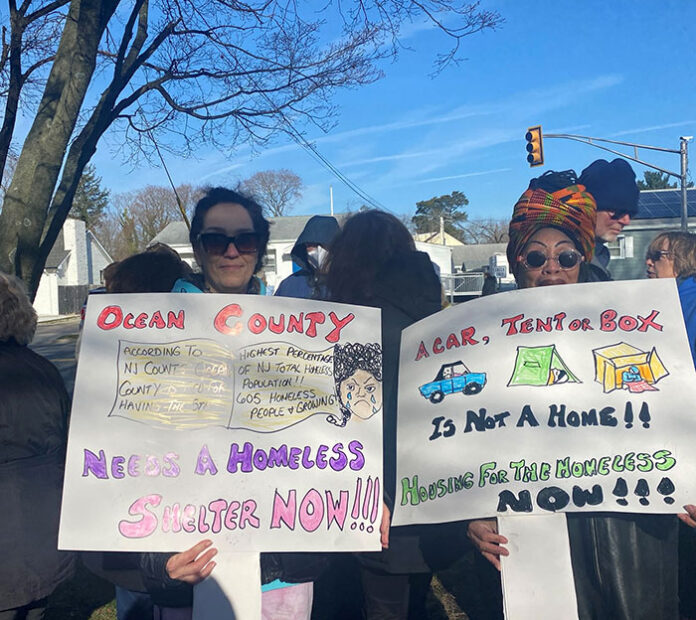
OCEAN COUNTY – After many years of criticism over the way Ocean County handles homelessness, the leaders are creating a trust fund that will pay for temporary housing and other services.
The county will charge a $5 fee on certain documents filed or recorded with the County Clerk’s Office. In 2022, there were more than 130,000 documents, officials said. The fee is expected to go into effect Sept. 1.
“Based on the number of documents recorded over the last three years, the fund could raise anywhere from $275,000 to $390, 000,” Commissioner Barbara Jo Crea said. “These funds are raised annually and will be used to support ongoing homelessness and housing instability programs along with the Code Blue program.”
Code Blue is a state law that opens shelters when the temperature approaches freezing. All of the shelters are run by volunteers, church groups, and nonprofits.
The money will stay in Ocean County, officials said.
“We can use the funds raised by the Homelessness Trust Fund with more flexibility to provide rental assistance vouchers, supportive services and prevention services,” Crea said.
The money also can be used for the acquisition, construction, or rehabilitation of housing projects or units within housing projects that supply permanent affordable housing for homeless persons or families, including those at risk of homelessness.
“Per the Homelessness Trust Fund guidelines, the funds cannot be used by the County to build a homeless shelter,” Crea said. “They will be used to provide support services.”
The county will also create a task force to oversee the fund and serve as an advisory board to the commissioners.
“We are seeing increases in the under employed and families are having a difficult time making ends meet and keeping a roof over their head,” Commissioner Gary Quinn said. “We need to do more and this is one of the tools we have available to us to create a permanent funding source that can be used to help our residents.”
The funds can be used to interact with people coming in for shelter during Code Blue and get them the resources they need, he said.
“Nineteen percent of Ocean County households struggle with factors of housing insecurity,” Quinn said. “The creation of the Homelessness Trust Fund is in response to the changes we have seen in getting assistance to those who need it.”
The public hearing on the fund is scheduled for the July 6 Commissioner Board meeting held at 4 p.m. in Room #119 on the first floor of the Administration Building located at 101 Hooper Avenue, Toms River.
Advocates for the homeless welcomed the creation of the fund. Pastor Sue Jones of the Toms River Housing and Homeless Coalition said it is a very positive step, not only in how to treat people in need, but it shows a change in how the homeless are being viewed. The fact that the county government is making this decision speaks volumes.
This will provide a continual source of funding that will help people in need immediately as opposed to something like a grant that’s not sustainable, she said.
There’s a stigma out there about homelessness; some people think all homeless people are mentally ill or addicts. The truth is that there are many different reasons that people end up in this situation, she said.
The majority of people calling their help line are not on the streets but one step away, she said. These are people whose landlords are giving them the boot illegally, for example. There’s also a large number of seniors, particularly women, whose spouse has died and without two Social Security checks a month, they can’t make ends meet.
The major cause of homelessness is the lack of truly affordable housing, and the lack of good-paying jobs with benefits, she said.
The people on the streets are the visible sign of homelessness, but there are many more that the average person doesn’t see, she said.
The trust fund is not the total solution to the problem, she said, because homelessness is a complex issue that requires a complex response.
“We don’t expect the county to do it all,” she said. “We continue to be working with the county and municipalities to see how we can do this job better.”
When the county creates the task force to oversee the fund, she urged them to seat members who are well-versed with the plight of the homeless here and have a track record of making a difference.

Past Controversy
In previous interviews, county leaders have said they didn’t want to create the trust fund. They compared the $5 fee on documents to a tax levied on residents. It is unclear what led to this change.
Up until now, the county’s dealt with the homelessness problem by putting them up in motels when available. Being a shore community, that means only half the year. The Asbury Park Press reported recently that the county had to pay out $1.5 million to the estate of a homeless woman who they placed in a motel and was murdered. Alecia Perreault, 29, was just 89 pounds and disabled from rheumatoid arthritis, and had begged to be moved from a motel she said was too dangerous.
Ocean County is one of the only counties in New Jersey that doesn’t operate its own homeless shelter. This leaves nonprofits and houses of worship to open overnight-only shelters.
Advocates for the homeless sued the county to try to force them to open a shelter back in 2011. On a separate occasion, the Atlantic City Rescue Mission sued because Atlantic City was spending millions helping homeless people from Ocean County.
Nonprofit leaders have said that mayors have told them that they don’t want any shelter in their town. Some towns have been outright aggressive against the homeless. Lakewood’s government, for example, literally bulldozed a homeless encampment. They also removed trees from public areas to prevent homeless from sleeping under them.







